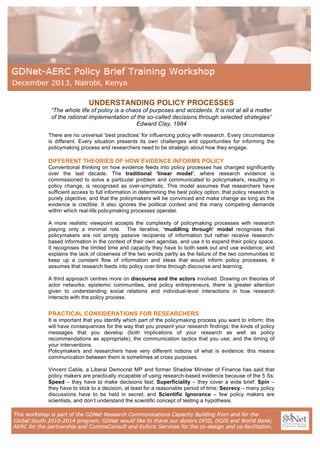
Understanding policy processes
- 1. UNDERSTANDING POLICY PROCESSES “The whole life of policy is a chaos of purposes and accidents. It is not at all a matter of the rational implementation of the so-called decisions through selected strategies” Edward Clay, 1984 There are no universal ‘best practices’ for influencing policy with research. Every circumstance is different. Every situation presents its own challenges and opportunities for informing the policymaking process and researchers need to be strategic about how they engage. DIFFERENT THEORIES OF HOW EVIDENCE INFORMS POLICY Conventional thinking on how evidence feeds into policy processes has changed significantly over the last decade. The traditional ‘linear model’, where research evidence is commissioned to solve a particular problem and communicated to policymakers, resulting in policy change, is recognised as over-simplistic. This model assumes that researchers have sufficient access to full information in determining the best policy option; that policy research is purely objective; and that the policymakers will be convinced and make change as long as the evidence is credible. It also ignores the political context and the many competing demands within which real-life policymaking processes operatei. A more realistic viewpoint accepts the complexity of policymaking processes with research playing only a minimal role. The iterative, ‘muddling through’ model recognises that policymakers are not simply passive recipients of information but rather receive researchbased information in the context of their own agendas, and use it to expand their policy space. It recognises the limited time and capacity they have to both seek out and use evidence; and explains the lack of closeness of the two worlds partly as the failure of the two communities to keep up a constant flow of information and ideas that would inform policy processes. It assumes that research feeds into policy over time through discourse and learning. A third approach centres more on discourse and the actors involved. Drawing on theories of actor networks, epistemic communities, and policy entrepreneurs, there is greater attention given to understanding social relations and individual-level interactions in how research interacts with the policy process. PRACTICAL CONSIDERATIONS FOR RESEARCHERS It is important that you identify which part of the policymaking process you want to inform: this will have consequences for the way that you present your research findings; the kinds of policy messages that you develop (both implications of your research as well as policy recommendations as appropriate); the communication tactics that you use; and the timing of your interventions. Policymakers and researchers have very different notions of what is evidence: this means communication between them is sometimes at cross purposes. Vincent Cable, a Liberal Democrat MP and former Shadow Minister of Finance has said that policy makers are practically incapable of using research-based evidence because of the 5 Ss: Speed – they have to make decisions fast; Superficiality – they cover a wide brief; Spin – they have to stick to a decision, at least for a reasonable period of time; Secrecy – many policy discussions have to be held in secret; and Scientific Ignorance – few policy makers are scientists, and don’t understand the scientific concept of testing a hypothesis.
- 2. RESEARCH DISSEMINATION, COMMUNIATION AND UPTAKE: RELATED BUT DIFFERENT THE GDNet PROCESS OF INFLUENCING POLICY
